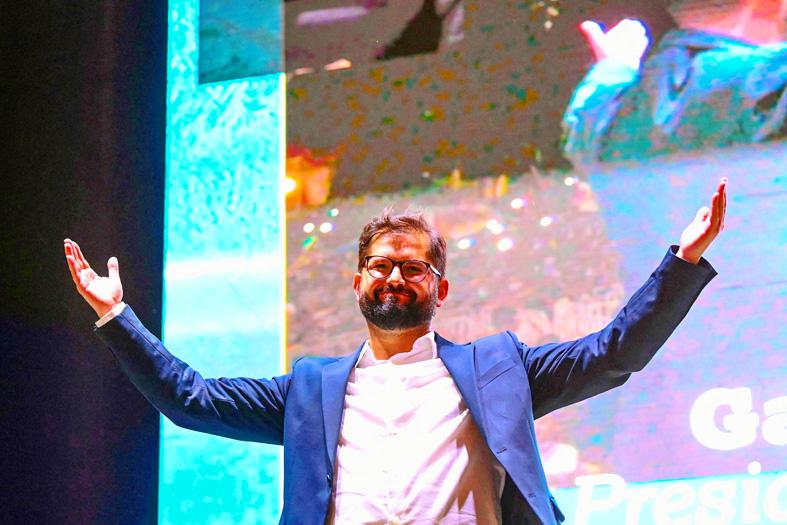The streets of Santiago on Sunday erupted in celebration after leftist millennial Gabriel Boric became Chile’s youngest president-elect with an unexpectedly large victory over his far-right rival in a polarizing race.
Boric, 35, garnered nearly 56 percent of the vote compared with 44 percent for Jose Antonio Kast, who conceded even before the final result was known.
Tens of thousands of Chileans took to the streets of the capital and other cities after Kast’s concession, honking horns in approval, brandishing pro-Boric placards, waving the rainbow LGBTQ flag and shouting: “Viva Chile.”

Photo: AFP
Fireworks lit the skies for hours.
“I’m thrilled, I am crying with joy. We dealt a blow to fascism,” pharmacy worker Jennie Enriquez, 45, said.
“I am happy because there are going to be many changes that will help the people and the working class,” construction worker Luis Astorga, 58, added.
Boric had campaigned on the promise of installing a “social welfare” state, increasing taxes and social spending in a nation with one of the world’s largest gaps between rich and poor.
Branded a “communist” by his detractors, he vowed in his first official address to “expand social rights” in Chile, but to do so with “fiscal responsibility.”
“We will do it protecting our macroeconomy, we will do it well ... to improve pensions and healthcare,” he said.
Kast congratulated Boric, who leads an alliance that includes Chile’s Communist Party, “on his great triumph.”
“From today on, he is the president-elect of Chile, and he deserves all our respect and constructive cooperation. Chile always comes first,” he said.
Kast is an apologist for brutal Chilean dictator Augusto Pinochet and his neo-liberal economic model, credited with Chile’s relative wealth, but blamed for its deep-rooted social inequality.
He opposes same-sex marriage, contraception and abortion, and had initially pledged to close the Chilean Ministry of Women’s Affairs, a promise he later rowed back on.
According to a projection by Chile’s Servel election body, turnout was more than 55 percent — a record since voting became voluntary in 2012.
Boric won by a margin of nearly 1 million ballots out of 8.3 million cast by 15 million eligible voters.
“Clearly more young people came out, it seems clear ... that Boric managed to mobilize the segment that is more difficult to mobilize, which is the segment of young people,” Claudia Heiss of the University of Chile said.
“All [Kast’s] anti-rights, anti-women, anti-gay speech, I think it helped mobilize that young segment,” she said.
The new president faces the difficult task of healing a society reeling from a polarizing campaign replete with antagonistic attacks and fake news onslaughts.
For a nation that has voted centrist since the democratic ousting of Pinochet 31 years ago, it was a stark choice between two polar opposite political outsiders.
Boric on Sunday reiterated his plans for “a more humane Chile, a more dignified Chile, a more egalitarian Chile.”

GAINING STEAM: The scheme initially failed to gather much attention, with only 188 cards issued in its first year, but gained popularity amid the COVID-19 pandemic Applications for the Employment Gold Card have increased in the past few years, with the card having been issued to a total of 13,191 people from 101 countries since its introduction in 2018, the National Development Council (NDC) said yesterday. Those who have received the card have included celebrities, such as former NBA star Dwight Howard and Australian-South Korean cheerleader Dahye Lee, the NDC said. The four-in-one Employment Gold Card combines a work permit, resident visa, Alien Resident Certificate (ARC) and re-entry permit. It was first introduced in February 2018 through the Act Governing Recruitment and Employment of Foreign Professionals (外國專業人才延攬及雇用法),

RESILIENCE: Deepening bilateral cooperation would extend the peace sustained over the 45 years since the Taiwan Relations Act, Greene said Taiwan-US relations are built on deep economic ties and shared values, American Institute in Taiwan (AIT) Director Raymond Greene said yesterday, adding that strengthening supply chain security in critical industries, enhancing societal resilience through cooperation and deepening partnerships are key to ensuring peace and stability for Taiwan in the years ahead. Greene made the remarks at the National Security Youth Forum, organized by National Taiwan University’s National Security and Strategy Studies Institution in Taipei. In his address in Mandarin Chinese, Greene said the Taiwan-US relationship is built on deep economic ties and shared interests, and grows stronger through the enduring friendship between

CAUTION URGED: Xiaohongshu and Douyin — the Chinese version of TikTok — are tools the Chinese government uses for its ‘united front’ propaganda, the MAC said Mainland Affairs Council (MAC) Minister Chiu Chui-cheng (邱垂正) yesterday urged people who use Chinese social media platforms to be cautious of being influenced by Beijing’s “united front” propaganda and undermining Taiwan’s sovereignty. Chiu made the remarks in response to queries about Chinese academic Zhang Weiwei (張維為) saying that as young Taiwanese are fond of interacting on Chinese app Xiaohongshu (小紅書, known as RedNote in English), “after unification with China, it would be easier to govern Taiwan than Hong Kong.” Zhang is professor of international relations at Shanghai’s Fudan University and director of its China Institute. When giving a speech at China’s Wuhan

ENHANCE DETERRENCE: Taiwan has to display ‘fierce resolve’ to defend itself for China to understand that the costs of war outweigh potential gains, Koo said Taiwan’s armed forces must reach a high level of combat readiness by 2027 to effectively deter a potential Chinese invasion, Minister of National Defense Wellington Koo (顧立雄) said in an interview with the Chinese-language Liberty Times (sister newspaper of the Taipei Times) published yesterday. His comments came three days after US Secretary of State Marco Rubio told the US Senate that deterring a Chinese attack on Taiwan requires making a conflict “cost more than what it’s worth.” Rubio made the remarks in response to a question about US policy on Taiwan’s defense from Republican Senator John Cornyn, who said that Chinese